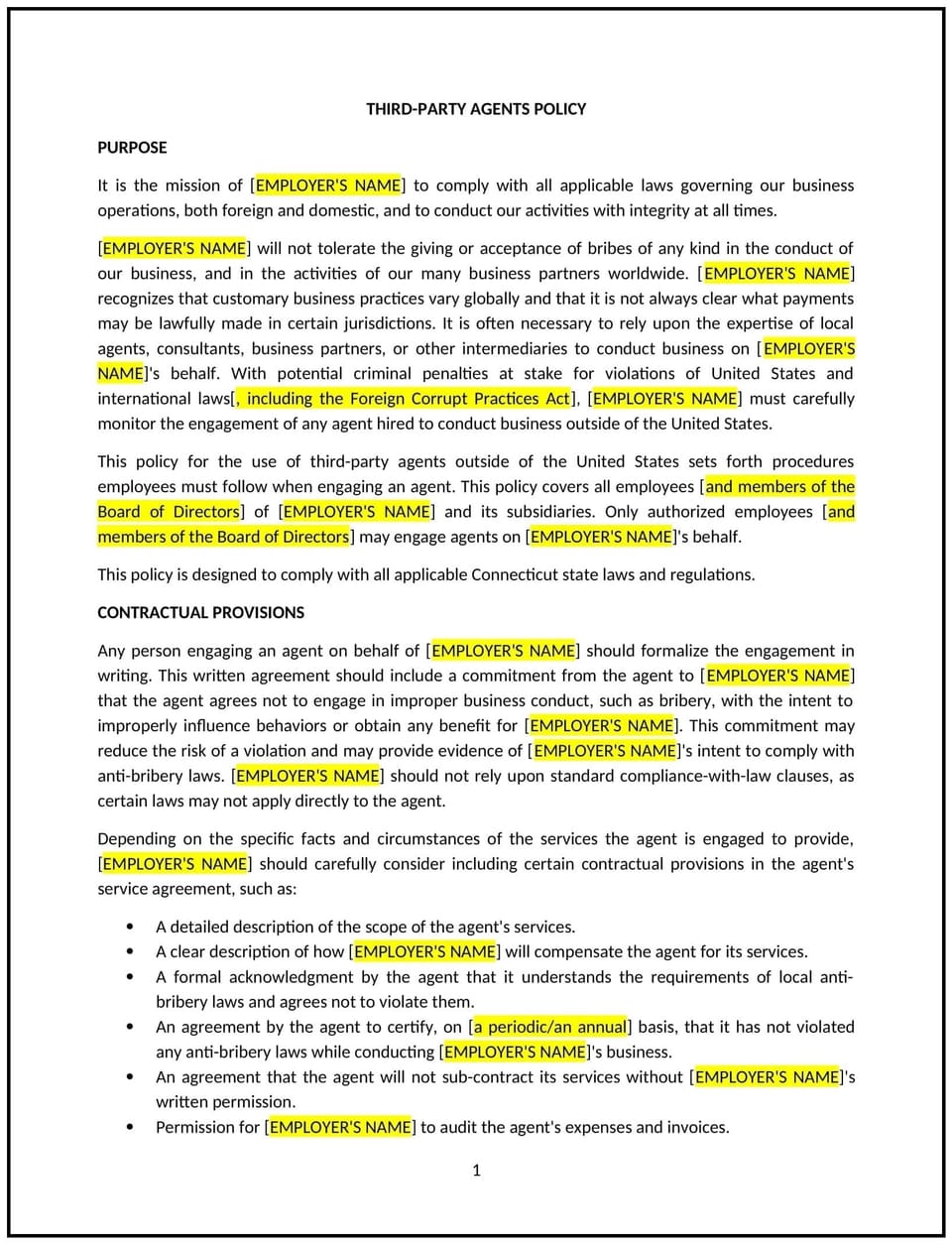Third-party agents policy (Connecticut): Free template

Third-party agents policy (Connecticut)
A third-party agents policy helps Connecticut businesses define the rules and expectations when engaging third-party vendors, contractors, or agents who act on behalf of the company. This policy outlines how third-party agents should conduct business on behalf of the company, ensuring compliance with laws, maintaining company standards, and protecting the company’s reputation.
By implementing this policy, businesses can manage relationships with third-party agents effectively, mitigate risks, and ensure that third parties align with the company’s ethical standards and legal obligations.
How to use this third-party agents policy (Connecticut)
- Define third-party agents: Specify who qualifies as a third-party agent, including contractors, vendors, consultants, and service providers who perform services on behalf of the company.
- Set expectations for conduct: Outline the company’s expectations for the behavior and performance of third-party agents, ensuring that they act in the best interests of the company and maintain the company’s values, ethical standards, and compliance with laws.
- Require compliance with laws and regulations: Ensure that third-party agents understand their obligation to comply with all applicable state, federal, and international laws, including data privacy laws, anti-corruption laws, and labor regulations.
- Establish monitoring and oversight: Outline the process for monitoring third-party agents’ performance and ensuring compliance with the terms of their agreements, including audits, reviews, and performance evaluations.
- Clarify contractual obligations: Specify the contractual terms that third-party agents must adhere to, including non-disclosure agreements, confidentiality clauses, indemnification provisions, and performance metrics.
- Protect company assets and reputation: Emphasize the importance of protecting company assets, intellectual property, and reputation when working with third-party agents, and outline procedures for addressing any potential conflicts of interest or misuse of company resources.
- Set termination guidelines: Establish the conditions under which the business can terminate agreements with third-party agents, including breach of contract, non-compliance, or unethical conduct.
Benefits of using this third-party agents policy (Connecticut)
This policy offers several benefits for Connecticut businesses:
- Reduces legal risks: By ensuring that third-party agents comply with applicable laws and regulations, the policy helps mitigate legal risks and ensures the company avoids liability for the actions of third-party agents.
- Maintains ethical standards: The policy helps maintain high ethical standards by ensuring that third-party agents act in line with the company’s values and compliance expectations.
- Enhances accountability: The policy establishes clear expectations for third-party agents, making them accountable for their actions and performance, which helps improve overall business operations.
- Protects the company’s reputation: By setting standards for conduct, the policy ensures that third-party agents do not engage in actions that could harm the company’s reputation or business relationships.
- Improves oversight: The policy establishes processes for monitoring third-party agents, ensuring that their activities are aligned with company goals and legal requirements.
Tips for using this third-party agents policy (Connecticut)
- Communicate the policy clearly: Ensure that all third-party agents understand the company’s expectations, legal requirements, and ethical standards before entering into agreements.
- Monitor compliance: Regularly review the performance of third-party agents, conduct audits, and ensure that they are meeting contractual obligations and complying with company standards.
- Establish strong contracts: Ensure that all third-party agent agreements include detailed terms, including compliance clauses, confidentiality agreements, and termination provisions.
- Provide training: Offer training for third-party agents on company policies, legal requirements, and ethical conduct to help them align with company standards.
- Review periodically: Update the policy regularly to reflect changes in laws, industry standards, or company practices, ensuring it remains relevant and effective.
Q: How does this policy benefit my business?
A: The policy helps ensure that third-party agents act in the company’s best interest, comply with legal and ethical standards, and maintain the company’s reputation, reducing legal risks and improving business performance.
Q: Who qualifies as a third-party agent?
A: A third-party agent can be any contractor, vendor, consultant, or service provider who performs services on behalf of the company. The policy should clarify the specific types of third parties it applies to.
Q: What is expected of third-party agents?
A: Third-party agents are expected to act in line with the company’s values and comply with all applicable laws, regulations, and contractual terms. The policy should outline the company’s standards for conduct, performance, and compliance.
Q: How does the company monitor third-party agents?
A: The company should regularly monitor third-party agents through audits, performance reviews, and compliance checks to ensure they are meeting the terms of their agreements and maintaining ethical standards.
Q: How often should this policy be reviewed?
A: The policy should be reviewed annually or whenever there are changes to Connecticut laws, federal regulations, or company practices to ensure it remains effective, compliant, and relevant to the business needs.
This article contains general legal information and does not contain legal advice. Cobrief is not a law firm or a substitute for an attorney or law firm. The law is complex and changes often. For legal advice, please ask a lawyer.


